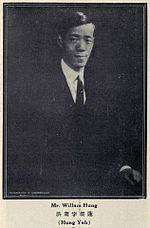William Hung (sinologist), Date of Birth, Place of Birth, Date of Death
TweetWilliam Hung (sinologist)
historian of China
 Date of Birth: 27-Oct-1893
Date of Birth: 27-Oct-1893
 Place of Birth: Fuzhou, Fujian, China
Place of Birth: Fuzhou, Fujian, China
Date of Death: 22-Dec-1980
Profession: historian
Zodiac Sign: Scorpio 
About William Hung (sinologist)
- William Hung (Chinese: ??; 27 October 1893 – 22 December 1980), was a Chinese educator, sinologist, and historian who taught for many years at Yenching University, Peking, which was China's leading Christian university, and at Harvard University.
- He is known for bringing modern standards of scholarship to the study of Chinese classical writings, for editing the Harvard-Yenching Index Series, and for his biography, Tu Fu: China's Greatest Poet.
- He became a Christian while a student at the Anglo-Chinese College in Fuzhou, then went to Ohio Wesleyan University, Delaware, Ohio, Columbia University, and Union Theological Seminary.
- On his return to China, he became Professor and Dean of Yenching University, where he was instrumental in establishing the Harvard-Yenching Institute.
- He came to Harvard in 1946 and spent the rest of his life in Cambridge, Massachusetts, teaching and mentoring students. William Hung was the oldest of six children.
- His father gave him the "school name" Hong Ye ("Great Enterprise"), and then when he left for the United States he took the given name William.
- He married Rhoda Kong in 1919, and the couple had three children, Ruth, Gertrude, and Agnes.
Read more at Wikipedia

